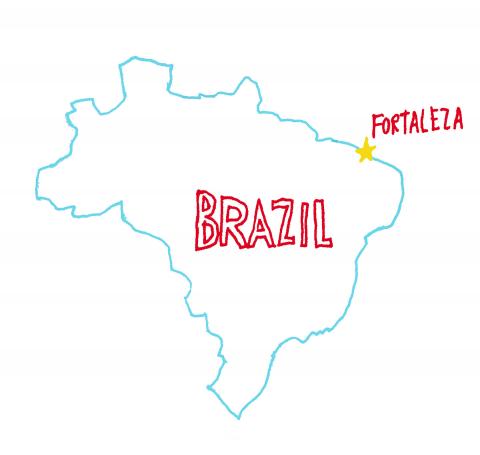by Faith Adams, Communications Director
A pediatric cardiac team from the Heart Center at Seattle Children’s Hospital is in Fortaleza, Brazil, this week on a full-team training visit to our newest partner hospital.
Children’s HeartLink and Hospital de Messejana have signed a Memorandum of Understanding launching this multi-year partnership, our second in Brazil. We also have a partner hospital in São José do Rio Preto that is matched to a pediatric cardiac team from Mayo Clinic.
Fortaleza, which means fortress in Portuguese, is one of just two programs in north and northeast Brazil that serves children who need complex heart surgery. This is a region that is home to almost 70 million people. The waiting list from the city of Fortaleza alone has 200 children’s names on it.

Worldwide, one in 120 children are born with congenital heart disease, and 90 percent of these children live where there is inadequate medical care. Children’s HeartLink is working to change that by matching medical volunteer teams with pediatric cardiac programs in Brazil, China, India, Malaysia, Ukraine and Vietnam.
Children’s HeartLink Country Director Andreas Tsakistos explains that the pediatric cardiac program at Hospital de Messejana was chosen in part because of the enormous need in that region of Brazil. “As is the case with all of our partner sites, there is much room for improvement and growth in order to provide care for the children in that region,” says Andreas. “That’s why we’re so fortunate that the team from Seattle Children’s agreed to work with this program in Fortaleza. Both teams have exceptionally talented leaders, and I have every confidence that, by working together, this program in Brazil will make great strides over the next several years.”
The initial site assessment visit took place in September 2014, when the Seattle team traveled to Fortaleza. Then in April the Fortaleza team traveled to Seattle for observational training at the Heart Center at Seattle Children’s. Children’s HeartLink’s approach includes training visits in both directions, as this has proven to be the most effective way to demonstrate and reinforce some of the key features of a successful program, including the team-based approach to care that results in the best patient outcomes.

“We’re honored to be the exclusive training site and to use our expertise to help ensure kids in Fortaleza will have access to high-quality cardiac care,” says Dr. Mark Lewin, division chief of cardiology and co-director of the Heart Center at Seattle Children’s Hospital. “Our goal will be to evaluate each element of the program—from their technology and surgical protocols, to their infection control practices and administrative structure—and support them in establishing a truly sustainable program that will allow them to care for a larger, more complex population of patients in a safe and effective manner.”
Brazil is the largest country in South America and the world’s fifth largest country in both population and geographic area. It occupies nearly half of the continent of South America.
To help meet the great demand for pediatric cardiac care, Children’s HeartLink’s partner sites that advance to become centers of excellence then become training centers for more programs throughout their region—ultimately reaching many more children awaiting care.
“This trip to Fortaleza represents our most recent collaboration with Children’s HeartLink, which members of our group have previously collaborated with to assist sites in China, India and Ukraine,” says Dr. Jonathan Chen, chief of pediatric cardiovascular surgery and co-director of the Heart Center at Seattle Children’s Hospital. “In our first trip to Brazil last year we identified areas of opportunity, and we hope to more distinctly evaluate and address these specific aspects of congenital heart care this year with our comprehensive team. All of these trips are building blocks to our ongoing commitment to share the expertise of Seattle Children’s Heart Center with the goal of improving congenital cardiac care for children worldwide.”
